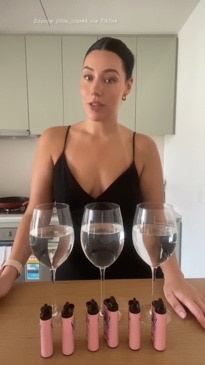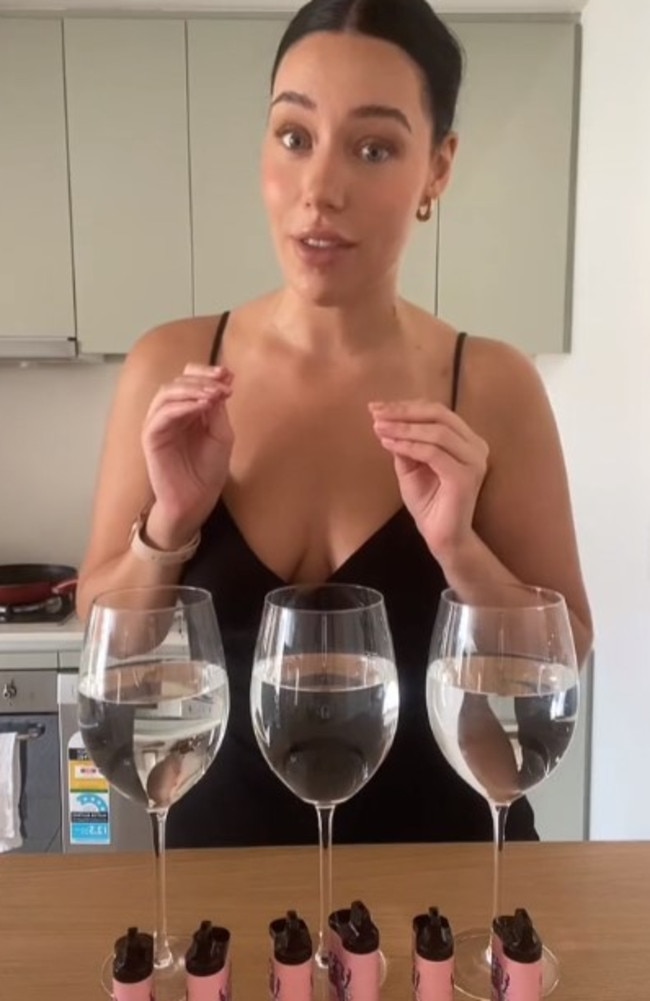Sydney woman ‘addicted to vaping’ documents quitting journey
Jillie Clark has revealed the “terrible” habit she developed, that at its worse, she’d do morning and night – and it even interrupted her sleep.

Australia’s ban on vape importation has come into effect, meaning it’s going to be harder for people to get their hands on the single-use devices.
Jillie Clark, 25, began vaping three years ago. She never smoked cigarettes. Vaping had begun as a social thing.
But after trying the popular device, which new research found is “10 times worse” than smoking for oral health, the young Sydney woman quickly found herself addicted.
“It is a bit embarrassing to admit it, but the fact is initially, I really pushed through that first process to make myself a vaper, which is terrible,” Jillie told news.com.au.
“But it wasn’t something that came naturally to me having never been a smoker.
“I think unfortunately, part of it is a societal thing. I wanted to fit in and I forced myself to learn how to vape and subsequently became addicted to nicotine.”
About 18 months ago, Jillie noticed it had become something she relied on.
Without hesitation, she would find herself reaching for her vape first thing in the morning, and it was the last thing she did before she went to sleep.

At the height of her addiction, she found she couldn’t go back to sleep if she woke up in the middle of the night, unless she’d taken a hit from her vape.
She also noticed she was having difficulty breathing.
The long-term health effects of vaping are unclear, but health experts have warned in the short-term using e-cigarettes has been associated with nausea, vomiting, mouth and airway irritation, chest pain and heart palpitations, according to NSW Health.
So when the Sydneysider decided to take part in the 75 Hard Challenge, a gruelling fitness challenge that involves regular exercise, a ban from alcohol and two litres of water a day – she decided to quit her nicotine addiction too.
“I think I got to a point where I realised the only time that I actually enjoy vaping is when I think I can’t,” she said.
“Whether that means I’m in a meeting or I’m at a restaurant or I’m at work or whatever, the only time I actually enjoy the vape is after a period that I wouldn’t have otherwise been able to.
“I realised it had nothing to do with the vape, it’s the mentality and I am stronger than that mentality. So why not quit?”

She began to document her journey on social media, taking people through the highs and lows. It has only been a week but it has been filled with withdrawal symptoms.
In one of her videos, she said she felt “chaotic” after giving up the nicotine, and that she was struggling to sleep.
“I would say sleeping has actually been harder. But I think part of that is because of being deprived from nicotine,” she said.
“But I definitely know that over time that will completely subside. Yeah, I think if anything, I have more energy, which is an interesting one. But sleeping is so hard.”
On day four, Jillie almost bought a vape. She was walking by a tobacconist and trying to rationalise buying one, thinking she just wouldn’t post about it and no one would know.
“I genuinely felt as though I was a meth addict talking to myself in my own head,” she said.

“I fully went through several different scenarios as to how I was going to hide this and how I could essentially lie about going and getting a vape.
“It scared me because when I was in that moment and I realised this is a proper addiction.”
Dr Christina Watts, a Research Fellow in Lung Cancer Policy and Evaluation Stream at the Daffodil Centre and UNSW, said what Ms Clark was experiencing was pretty typical signs of nicotine withdrawal.
“Common symptoms of nicotine withdrawal – there are a range of different things. So for example, mood changes and irritability,” Dr Watts told news.com.au.
“Sometimes people experience difficulty sleeping or feeling breathless. And, of course, the one that many people here have is those feelings of cravings and wanting to go back to getting their nicotine hit.”
On the of vape importation ban into Australia, Dr Watts said she thought it was going to be effective in helping people quit.

“We’ve done research that specifically has interviewed and surveyed young people to find out how accessible these vapes are and what would actually be effective in curbing their use,” she said.
“One of the biggest issues before now is that vapes were very freely accessible and what these laws do is prevent young people from accessing vapes.”
She said there was already a large supply of vapes in the country, but eventually that supply would run out.
“It is really encouraging to see young people going to see medical professionals and even documenting their journey and talking to other people, other young people, and encouraging them to quit vaping in the face of these laws,” she said.
“So hopefully, it will be a case of more and more people deciding to stop — knowing that they won’t have access to these products long term.”






